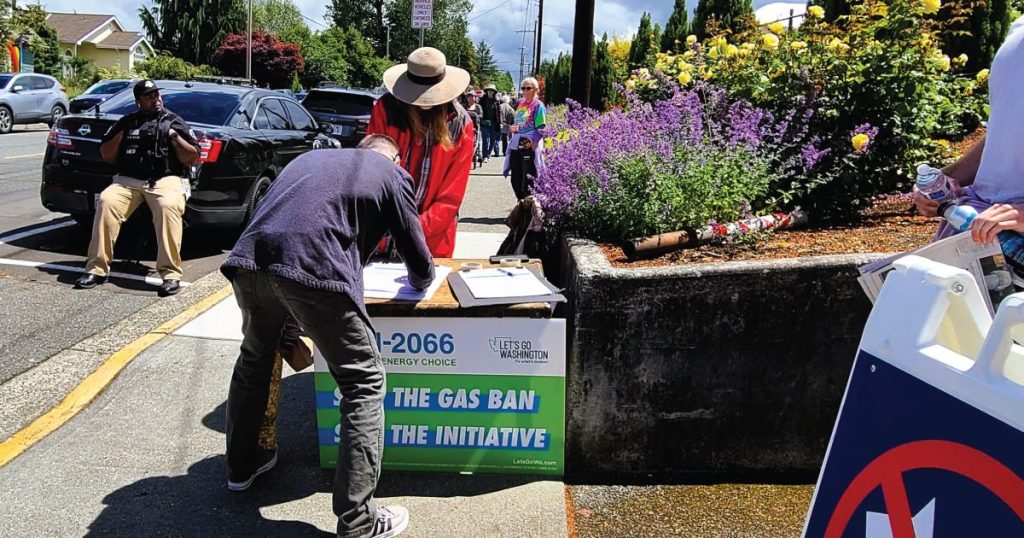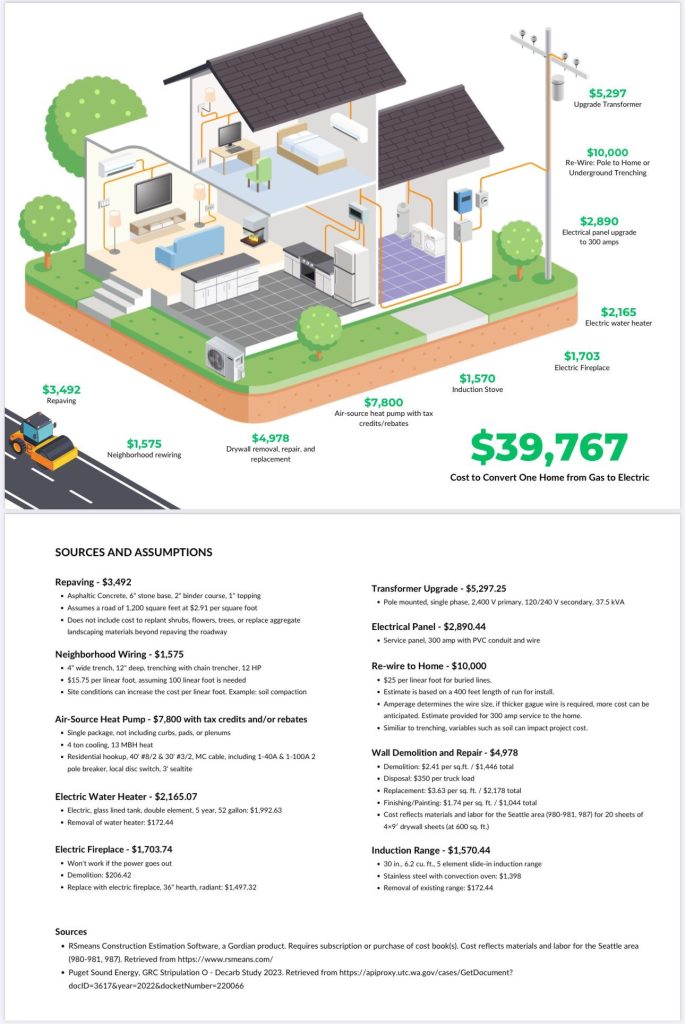THURSTON COUNTY—The Building Industry Association of Washington (BIAW), Let’s Go Washington, and the Washington Housing Association celebrated submitting 431,063 signatures to the Secretary of State’s Office Tuesday, July 2, to qualify placing Initiative 2066 (I-2066) – to protect natural gas as an energy choice and prevent gas bans – on the upcoming November ballot.

By Washington State law, the Secretary of State’s Office required Let’s Go Washington to produce at least 324,516 signatures from registered Washington voters to place the initiative on the ballot. Let’s Go Washington gathered more than 400,000 in just 45 days.
Today, we proudly announced we have collected over 425,000 signatures from across Washington in support of Initiative 2066. This was a team effort with @letsgowa , @WAhospitality , WA Realtors, all our local homebuilding associations and more! We could not have done it without… pic.twitter.com/NzWG0SKoo6
— BIAW (@BIAofWA) July 2, 2024
“We needed roughly 325,000 signatures to qualify, and we went out in record time—45 days— and we’ve already collected 431,000 signatures,” said Brian Heywood of Let’s Go Washington. Building Industry Association of Washington (BIAW). “We’re sending a very clear message to Olympia that we expect you to use common sense and reasonableness when you make laws.”
The Secretary of State’s office recommends a “cushion” of 15 to 20% in case some of the signatures collected are duplicates or from non-voters – hence the odd requirement number.
“Many significant state laws have been adopted due to the initiative process since Washington became one of the first states to enact it in 1912,” said Secretary of State Steve Hobbs. “My office’s responsibility is to ensure it runs fairly, efficiently, and smoothly.”
Let’s Go Washington had until July 5 to gather the roughly 325,000 signatures. They still plan to submit another round of signatures Friday afternoon.
BIAW has fought against political efforts to end natural gas as an energy option for the last several years, at the local government and the state building code council.
I-2066 aims to protect, what these organizations consider, a “reliable energy choice like natural gas and propane” and prohibits a has ban in Washington. 24 other states across the country have similarly prohibited natural gas bans.

“As Washington prepares to celebrate Independence Day, it’s a perfect time to celebrate our right to energy freedom,” said Greg Lane, BIAW’s Executive Vice President. “Builders support energy choice because natural gas provides warmth and comfort to more than a million Washington homes. It’s also the lifeblood of thousands of restaurants and businesses.
“The people of Washington demand the freedom to use natural gas in their homes,” Lane continued. “That’s why we’re seeing such strong support.”
Anthony Anton, President and CEO of the Washington Hospitality Association, fears that a state ban on natural gas would threaten several businesses and restaurants who depend on it with shutting down right after the COVI-19 virus already crippled several of them.
“We lost a lot of restaurants and great places during COVID,” Anton said. “The idea that we would have to be here today to say, please don’t put people through that again, was a little bit shocking,” said Anton. “[b]ut the community has rallied and said we’re not going to let that happen.”
Let’s Go Washington, a conservative group founded by Redmond businessman Brian Heywood, turned in a total of 2,662,310 signatures between late November through December 28 last year to qualify six landmark initiatives.
At a legislative preview hosted by the Washington State Association of Broadcasters and Allied Daily Newspapers of Washington earlier in January, House Speaker Laurie Jenkins shared her disdain for Let’s Go Washington and specifically its founder, Heywood, comparing their efforts to the “Robber Barons” of the 19th century.
Back in March three out of six of Let’s Go Washington’s initiatives were passed by both chambers of the legislature: I-2081, concerning parental rights which passed the Senate unanimously and the House 82-15; I-2111, preventing Washington State from enforcing an income tax which passed 38-11 in the Senate and 76-21 in the House; and I-2113, amending statewide police pursuit laws passed in the Senate with a vote of 36-13 and 77-20 in the House.
The remaining three, including I-2066, were required to gather signatures to be placed on the November ballots to allow the public to decide their outcomes.
In 2021, the Washington State Legislature passed the Climate Commitment Act (CCA), which creates a market-based program (called the “cap-and-invest” program) to cap and reduce greenhouse gas emissions, according to the Department of Ecology. To achieve this, the scheme puts a price on greenhouse gas emissions emitted in Washington state increasing the cost to deliver electricity, natural gas, and carbon-based fuels that is forwarded to end-users.
Using a 1990 baseline, CCA seeks to reduce state greenhouse gas emissions 45 percent by 2030, 70 percent by 2040, and 95 percent and achieve net-zero emissions by 2050.
Starting on January 1, 2023, businesses and organizations that emit more than 25,000 metric tons of greenhouse gases a year such as carbon dioxide, were charged a carbon offset fee which is then used to invest in climate projects throughout the state and with the goal to transition Washington to a lower-carbon economy. Affected businesses include fuel suppliers, natural gas and electric utilities, waste-to-energy facilities (starting in 2027), and railroads (starting in 2031).
The cap-and-invest program sets a limit on overall carbon emissions in the state. Businesses emitting more than 25,000 metric tons of greenhouse gases a year are required to obtain carbon allowances equal to their covered greenhouse gas emissions which are purchased through quarterly auctions hosted by the Department of Ecology or bought and sold on a secondary market. Businesses not complying with the CCA program will be fined up to $50,000 per violation, per day by the Department of Ecology.
The state estimates approximately 75% of statewide greenhouse gas emissions will be covered under this cap-and-invest scheme. As of August, Washington state has received $1.213 billion in revenues from the three greenhouse gas allowance auctions with a fourth auction scheduled for December 6, 2023. An additional $184 million in revenue was collected on behalf of eligible electric and gas utilities to provide credits to customers for increased costs.
Currently thirteen states have adopted carbon pricing policies: California, Connecticut, Delaware, Maine, Maryland, Massachusetts, New Hampshire, New Jersey, New York, Rhode Island, Vermont, Virginia, and Washington.
Historically, Washingtonians have overwhelmingly rejected carbon pricing policies—in 2016 with I-732 at 59.25%, and in 2018 with I-1631 at 56.56%. According to the Washington State Public Disclosure Commission, a total of $2.7 million was spent by committees for and against I-732; whereas in 2018, that amount jumped to $47.9 million — $16.42 million in support and $31.58 million against.
If I-1631 would have passed, and assuming emissions would remain at 2019 levels of 102 million metric tons (the latest state reported data according to KING5), from 2020 to the end of 2023, the state would have received $7.344 billion in revenues to fund various environmental projects such as clean energy infrastructure and to increase the resiliency of water and forest resources.
Supporters of I-2066 include: Building Industry Association of Washington | Washington Hospitality Association | Associated General Contractors of Washington | Washington Aggregates & Concrete Association | NW Hearth, Patio & Barbecue Association | Washington Denturist Association | Associated Builders & Contractors Western WA Chapter | Associated Builders & Contractors Inland Pacific Chapter | Washington REALTORS | Washington State Tree Fruit Association.
Author: Kienan Briscoe













